Open science is a policy priority for the EU and mandatory in all of its research and innovation funding programmes. On a global level, the UNESCO recommendations on Open Science have been adopted by all member states. But how can institutions and countries implement and embed these policies? That was the theme of the “Open Science – From Policy to Practice” conference which was held on 16–17 May 2023 in Stockholm, and streamed online, in association with the Swedish Presidency of the Council of the European Union.
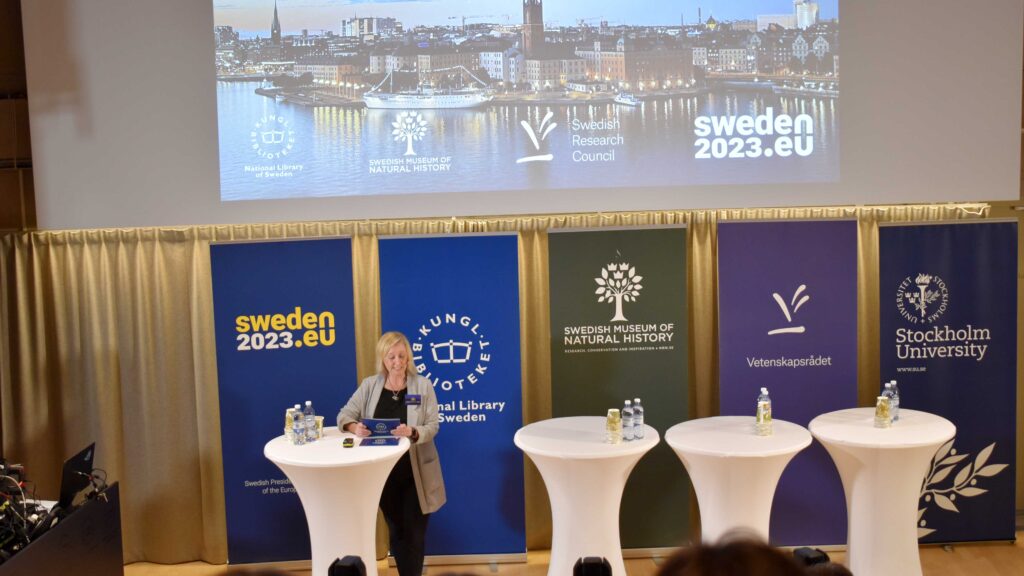
The two day conference highlighted different perspectives and included inspiring policy actions on how to implement Open Science as well as discussions on embedding Open Science in society. More than 130 government officials, policy makers, researchers, funders, science engagement professionals, civil society representatives and other stakeholders from across Europe, and beyond, joined the event in Stockholm, and 200 participants followed online.
Open Science Policies in Europe – development and monitoring of national policies
In their opening address Karin Grönvall, National Librarian at the National Library of Sweden, and Katarina Bjelke, Director General of the Swedish Research Council, stressed the need for open science by pointing out some of its many advantages: faster and broader impact of scientific findings and high quality research. They also highlighted the need for researchers to openly share their data.
The Swedish State Secretary Maria Nilsson said that open science is an important tool to prevent disinformation and science rejection among the public. She also emphasised that all stakeholders must work together in order to promote open science. “Only through collaboration and exchange of experiences will the path from policy to practice be realised.” According to Maria Nilsson, research infrastructure has to be renewed, since currently only a small proportion of the research data is publicly available. Ultimately all data should be FAIR and openly accessible.
One way in which policy has been successfully implemented into practice was showcased by Hanne Monclair, a Member of the UNESCO Open Science Steering Committee, who encouraged shared infrastructures that allow the data to be accessible at a transnational level. In addition, new financial models to support open access publishing and strategies to retain researchers’ copyrights are needed, according to Hanne Monclair. Open science does not only mean that research becomes openly available, but that the research process itself has to be “inclusive, equitable and sustainable”. The overarching goal should be to have “science as a global public good”.
Council conclusions and scholarly publishing
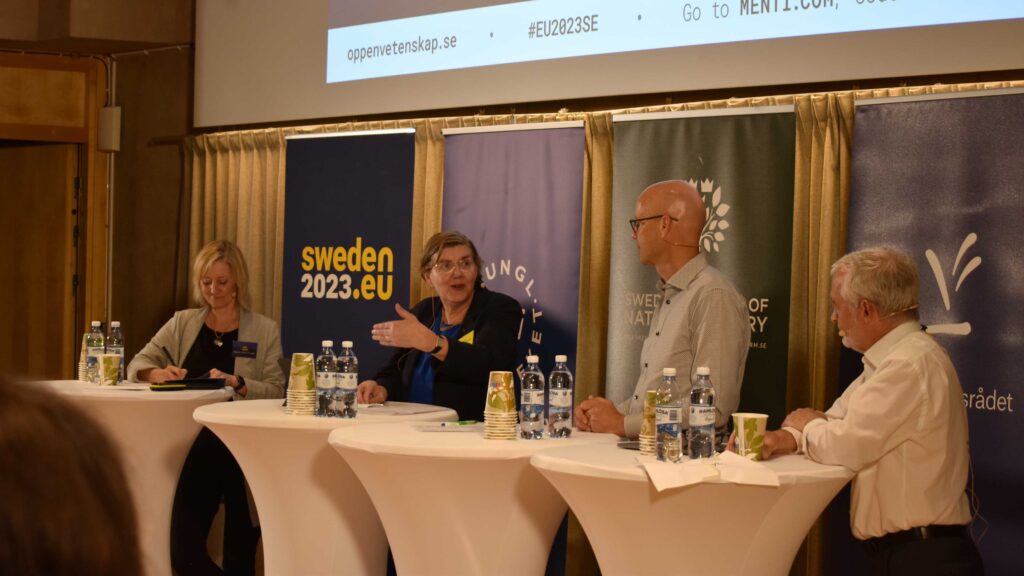
At this session the need for a European wide strategy towards open science was stressed, as science takes place across country borders. The new European Council conclusions which were adopted just after the conference, also call for transparent, equitable, and openly available scholarly publications. Together, the different stakeholders have to find viable open access financing models and innovative assessment models to judge researchers, not only by their scientific contributions, but also for e.g. their leadership and teaching skills.
A cultural change within the research environment is needed for open science to be successfully implemented. This means that resources and guidelines for a better research infrastructure in terms of data storage are needed, but also better education of researchers about open science. Despite the many challenges, especially the need to change the current research culture, Michael Arentoft, Head of the Open Science Unit, European Commission and, Karel Luyben, President, EOSC Association, remained optimistic that the council conclusions will contribute to a faster transition towards open science. As pointed out by Astrid Söderbergh Widding, President, Stockholm University, “Culture is the main issue, and incentives. It’s all about value; what do we value in research?”
Align research assessment with Open Science
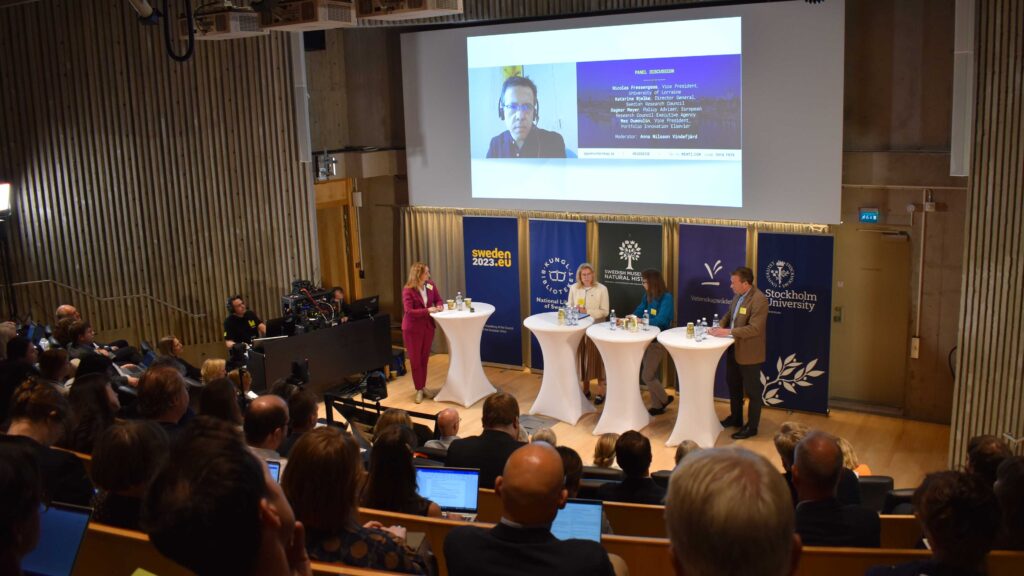
One of the major challenges for researchers conducting open science is the current research output assessment model, which, according to Nicholas Fressengeas, Vice President of the University of Lorraine, puts too little emphasis on open science. “There is a need for a new uniform assessment model which should span cross-countries and cross-disciplines,” he stressed. At the same time, he called for caution as “we are tampering with the heart of the machine when we change the way research is assessed”.
“We talk about cultural change and it will take time. Quality is in the content, not in the packaging,” said Dagmar Meyer, Policy Adviser, European Research Council. Katarina Bjelke, Director General, Swedish Research Council and Max Dumoulin, Vice President Portfolio Innovation, Elsevier, agreed that the current research assessment model is selecting high quality projects and researchers. Still, better policies, especially with regard to creating incentives for researchers to publish open access, and the help of institutions are needed to push open science forward. One way of modifying the current system is the CoARA agreement and additional collaboration between funding agencies across Europe to identify the best assessment system possible.
Advancing Open Science to the next level
EOSC, the European Open Science Cloud, provides storage and other related services for FAIR research data. The goal is to “unlock the full potential of research data to accelerate discoveries and innovation” by training more researchers to appliy open science to serve the public and private sectors in a better manner,” stated Karel Luyben, President, EOSC Association.
During the panel discussion that followed, Michael Arentoft, Head of the Open Science Unit, European Commission, Sofie Björling, Director for the Department of Research Infrastructures, Swedish Research Council, Astrid Söderbergh Widding, President, Stockholm University, and Jessica Lindvall, Head of Training, SciLifeLab Training Hub, highlighted the importance of research data management plans. Again, it was stressed that “collaboration is key” meaning that policymakers, funding agencies and institutions have to work closely together to pave the way for the implementation of open science in the research environments. “It is also important to align the national work with the international,” said Sofie Björling.
Citizen Science in policy and practice
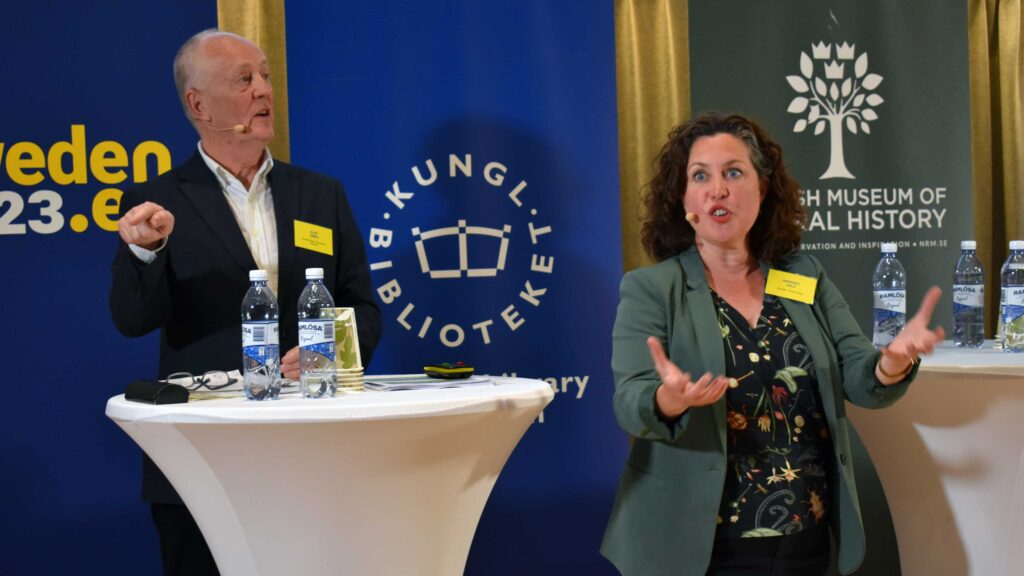
The final report from the European Commission’s Mutual Learning Exercise: “Citizen Science – Initiatives, Policy and Practice”, was presented at the conference by Alan Irwin, Chair of MLE Citizen Science, Copenhagen Business School, and Margaret Gold, Coordinator Citizen Science Lab, Leiden University. The exercise has identified best practices and policies on citizen science from across Europe.
Signe Ratso, Deputy Director General, DG R&I, European Commission, said that citizen science is an important tool to democratise science, as well as to conduct excellent research and innovation, while at the same time facilitating a closer relationship between science and the public in order to reduce the power of “fake news”. Additionally, citizen science can promote trust in science and plays a crucial role in open science strategies. Signe Ratso also said that she wished to see “as many citizen science European-wide projects as possible.” Margaret Gold, could not agree more. She showcased the successful implementation of citizen science in different European settings and stressed that “participatory practices are wide and diverse”. She advocated for the implementation of Citizen Science to be explicitly put into the definition of “excellence in science and innovation.”
Barbara Weitgruber, Director General, Federal Ministry of Education, Science and Research, Austria, and Adrian Curaj, General Director, together with Ioana Trif, Open Science Policy Expert, Executive Agency for Higher Education, Research, Development and Innovation Funding (UEFISCDI), Romania, presented how citizen science has been implemented in their respective national open science strategy. Besides national implementation, the speakers also encouraged fostering Europe-wide campaigns.
Recipes for science informed decision-making
Science and politics are indispensable. Even though they have very different characters as “science is based on evidence and politics is based on values,” they are intertwined, stated Mikael Karlsson, Associate Professor, Climate Change Leadership, Uppsala University. Scientists also need to reflect on their roles: “pure scientist, science arbiter, honest broker or activist?” And they have to be transparent about them. Politicians are increasingly listening to scientists but they are still not taking enough actions to address problems, like climate change.
Julian Keimer, Policy Analyst, European Commission Joint Research Centre, argued that it is of utmost importance to create more forums where researchers and policymakers can engage in dialogue, but their roles still have to remain clearly defined.
Scientists have a societal responsibility to address the most pressing problems through excellent science, but they also have to communicate their findings in a relatable way, with the support of their institutions, and also exercise humility, said Jessica Jewell, Associate Professor, Chalmers university/Young Academy of Sweden. Researchers have to “build trust and at the same time defend the integrity of science” while “policymakers have to be prepared for inconvenient answers” and take responsibility for making democratic decisions.
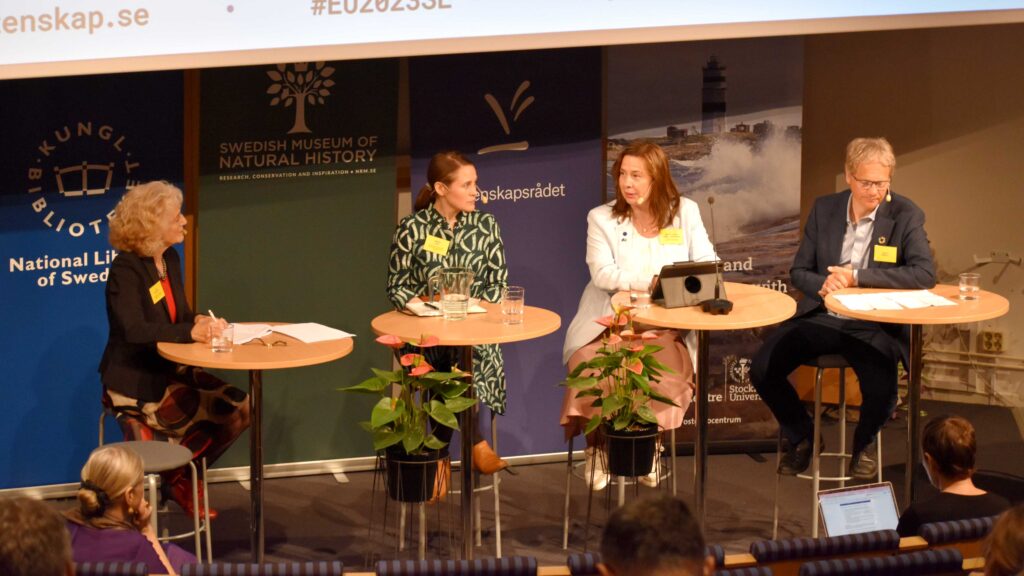
“Science and policy making is not a marriage made in heaven but they need to work together,” stated Amanda Wood, Researcher, Stockholm University Stockholm Resilience Centre. One solution to bridge the differences, suggested by Ellen Bruno, Policy Analyst, Stockholm University Baltic Sea Centre, are “knowledge brokers”, who facilitate a constant knowledge flow between scientists and decision makers. Marie-Louise Hänel Sandström, Member of the Swedish Parliament, concluded that “politicians need to meet more scientists and have more discussions; a foundation to make better decisions.”
Science communication and engagement as enablers for Open Science
Grand societal problems can only be solved through science if researchers, citizens and stakeholders work closely together. “Great science does not speak for itself,” said Anna Maria Fleetwood, Senior Adviser, Swedish Research Council. She pointed out science communication as one key facilitator and highlighted Science Europe’s member principles, and the recently adopted framework actions to enhance communication of science with society.
“Open science is more than just free access to scientific publications, which is why the transparent and understandable communication of science towards the public is a crucial part of the research process and should be considered more in the assessment of the researcher’s scientific output,” said Lidía Borrell-Damián, Secretary General, Science Europe. Besides, science engagement projects are great enablers to make science understandable to anyone, but also to help building trust between society and scientists and facilitating more informed decision making, which ultimately supports the democratic process.
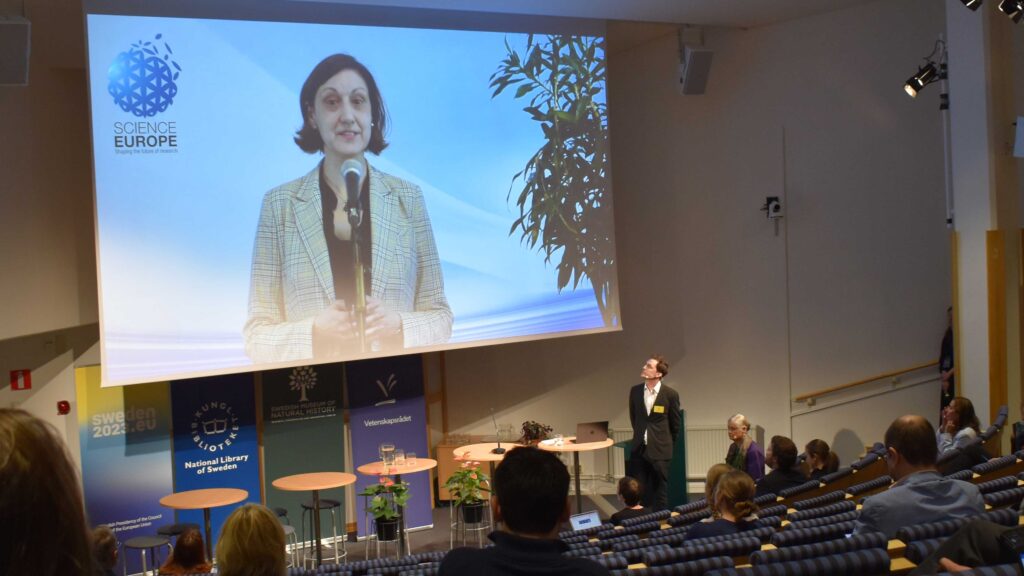
A comprehensive plan to build societal trust and to strengthen democracy is the Austrian 10 point TruSD programme, presented by Barbara Schrotter, Policy Advisor, Austrian Federal Ministry of Education, Science and Research. The programme includes activities designed for the whole education system from preschool children to high school pupils and then higher education students.
Another inspiring policy initiative is the Dutch National Centre of Expertise on Science & Society, which will be launched this year to help improve science communication. The new centre will contribute to “making current scicomm activities better, with more dialogue, and increase involvement of both researchers and society”. It will also make existing training in scicomm and science engagement more accessible and visible for practitioners, explained Alex Verkade, Coordinator of the new centre.
Accessibility to and involvement in science
Everyone should have the chance to gain scientific knowledge, independent of their background. Museums and science centres are important facilitators to engage citizens in science, to build public trust and to make a difference at a local and community level. “Science engagement is a crucial task for museums and science centres to help build science capital in society, not only across disciplines, but also across ages,” stated Bruno Maquart, President, Ecsite. Cissi Askwall, President, EUSEA, pointed out that both Ecsite and EUSEA help facilitate such engagement on a European level. “We need to open up to different actors and invite citizens and others to actively take part in conversations.”
Science has the knowledge, but museums and science centres have the mission to engage. “Thus, science centres would also like to be seen as part of the research strategy, and not only as the outreach strategy,” said Carina Halvord, CEO, Universeum Science Centre in Gothenburg. She described how the centre works in an interdisciplinary way, over generations, putting research into context, in order to strengthen people’s science capital.
“Science capital can be both exclusionary and elitist. Our job is to make sure that information found in Science Centres and Museums is accessible to everyone!” stated Sebastian Kvist, Research Director, Swedish Museum of Natural History. Peter C. Kjærgaard, Director, National History Museum, Denmark, added: “We need to think about ourselves as one big ecosystem for science engagement. Bring together all the actors and use the resources and tools that we already have.”
Conference conclusions
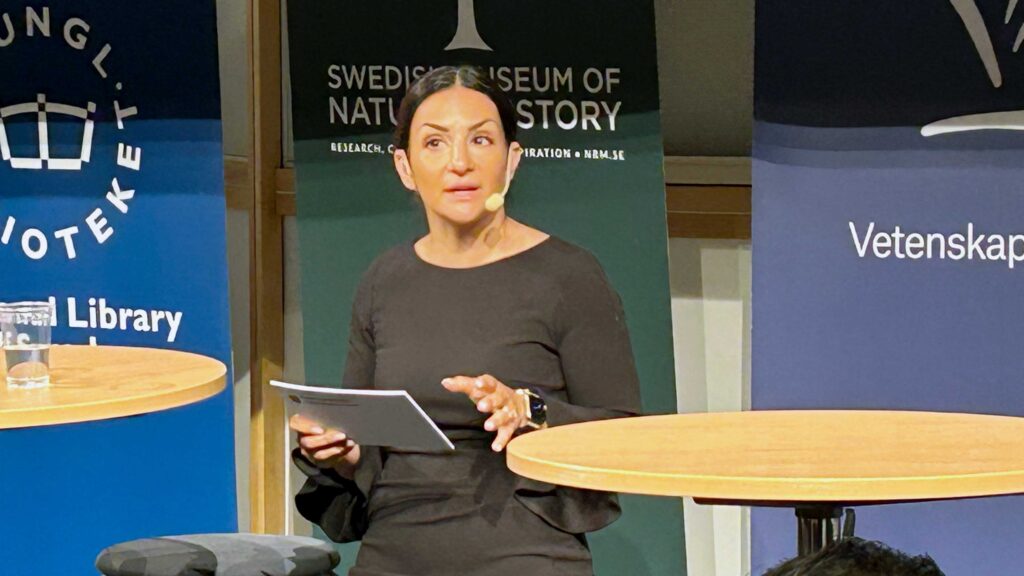
In the final part of the conference, Parisa Liljestrand, Swedish Minister for Culture, highlighted that society benefits most when different actors work together, which also means prioritising open science to promote dialogue between researchers and the public. “Research based knowledge has to be cared for, to be able to handle the large challenges we are facing.”
According to the minister, the accessibility of science to society is important to increase “mankind’s understanding of science”, the understanding of the scientific process, but also to strengthen research itself through public engagement. “Strengthening trust in science through open science means strengthening resistance towards knowledge resistance. She concluded: “The discussions during the conference have shown how important it is to involve many different societal players and organisations in the conversation.”
This conference has highlighted that we need national policy initiatives and actions to enable Open science, said Karin Grönvall, National Librarian, National Library of Sweden, in her concluding address. Lisa Månsson, Director General, Swedish Museum of Natural History, also emphasised the large interest and need from different societal sectors to come together and discuss the many aspects of Open Science.
More information
Recordings of the conference are available on this website and reports and publications mentioned during the conference can be found in the digital goodie bag. The event was organised by the National Library of Sweden, the Swedish Museum of Natural History and the Swedish Research Council with support from Riksbankens Jubileumsfond and in collaboration with the following partners the Association of Swedish Higher Education Institutions (SUHF), the European Commission Joint Research Centre, the European Network of Science Centres and Museums (Ecsite), EuroScience, the Swedish National Commission for UNESCO, the Swedish Science Centres, Stockholm University Baltic Sea Centre, Young Academy of Sweden, University Alliance Stockholm Trio and VA (Public & Science).